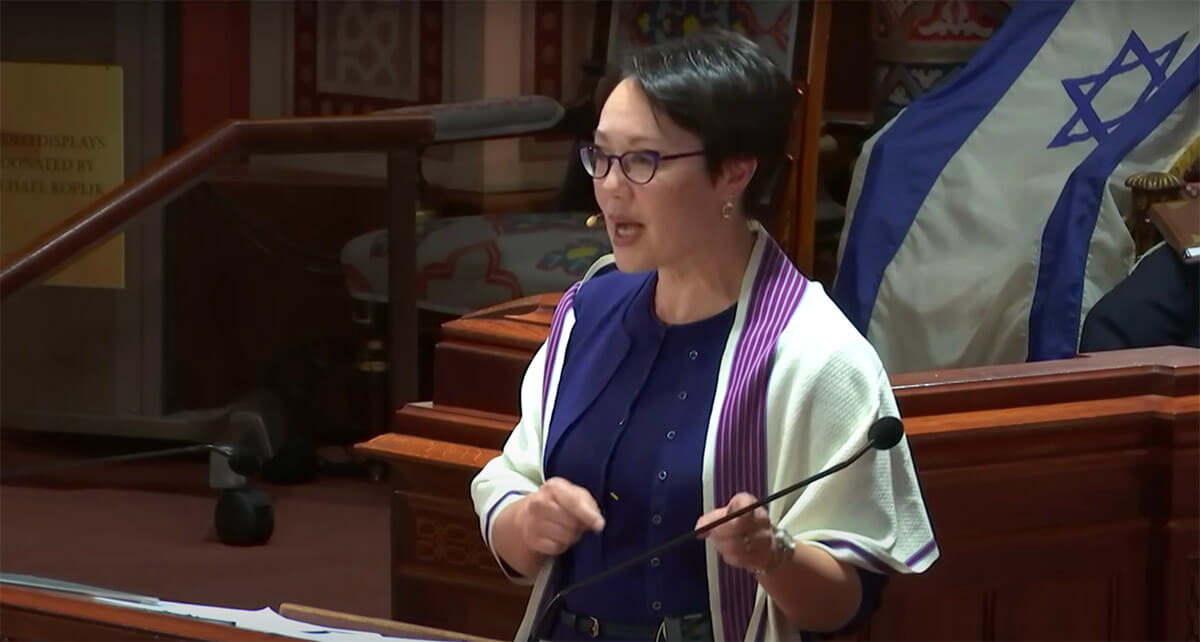‘There are no words’: When what’s not said is what hurts the most
“Words bolster nations, build bridges, and bring healing,” Rabbi Angela Buchdahl told her congregation. “But words can also become barriers, curses and weapons”

Rabbi Angela Buchdahl delivers her sermon on Oct. 13, 2023 at Central Synagogue in Manhattan. Courtesy of Central Synagogue
This essay was adapted from a sermon given Friday, Oct. 13 at Central Synagogue in Manhattan. Watch the full sermon.
Ein milim, ein milim — there are no words. This is what I hear over and over from Israeli family and friends since the largest, most vicious massacre of Jews since the Holocaust.
Ein milim. How can mere words describe the barbarism of hundreds of Hamas terrorists streaming into Israel with no other purpose than to hunt down and murder Jews — in their homes, at bus stops, at a music festival — while gleefully livestreaming their rampage to exultant crowds?
What words can you say to a father witnessing a video of his 20-year-old daughter, petrified, screaming, as Hamas terrorists motor her off into the abyss.
What words can convey the horror of Hamas terrorists storming into “safe rooms,” slaughtering parents before their children’s eyes, and then dragging those children down into the tunnels below the Gaza Strip?
Hamas terrorists seized elderly Holocaust survivors, set people on fire, and murdered babies. There is no depraved act you could possibly imagine that they did not do. There are no words.
As this murderous rampage unfurled on Shabbat, Jews around Israel, not yet knowing exactly what was happening, unfurled the Torah for the holiday of Simchat Torah.
They read the last chapter, which describes the death of Moses, and then the first, the story of creation. In a cosmic, haunting echo of what was going on around our Israeli family, the Torah cycle moved from Deuteronomy, whose Hebrew name Devarim literally means “words,” to a world that was tohu vavohu – ”formless and void, with darkness over the face of the deep.”
Israel, and the Jewish world, passed from words to no words.
But then, in the creation story, God said: “Let there be light” and there was light. God creates light – creates the entire world – with words.
As a Jewish people, we understand the power of words to create reality. Words bolster nations, build bridges, and bring healing. But words can also become barriers, curses and weapons.
Jews have never ascribed to the childhood rhyme that “words will never hurt us.” We know how very potent they are. And we also know how silence – the absence of words – can enable evil and chaos.
As I sat heartsick and devastated by the deadly violence in Israel, I was shocked by the words that kept appearing in response. Words like “resistance,” “decolonizing” and “freedom fighters” that valorized and celebrated Hamas terrorism. Words that, perversely, found a way to blame Israel for these monstrous attacks.
Equally upsetting were the muted or ethically opaque statements from the people we look to for moral leadership. University presidents somehow could not bring themselves to state clearly the simple truths of these attacks: That the perpetrators were terrorists, and their victims were Jews.
I belong to an interfaith group representing most of the major churches, synagogues and mosques in New York. This week, leaders in that group attempted to issue a statement in response to the Hamas attack. But their draft was limited to platitudes. We stand in solidarity with the people of the region. We call to stop the violence in the Holy Land.
The leaders of our faith community could not just say the words: We condemn Hamas terrorism and this massacre. After some back and forth, the group never issued a statement at all.
Another interfaith group seeking to raise money for the region wrote an email decrying the “cycle of violence” and “intergenerational trauma.” I cringed. This heinous attack was not just part of a “cycle of violence.” Intergenerational trauma can never justify the mass murder and abduction of civilians.
These academics and faith leaders have made careers out of words, and they know their power. But we saw them choose words that made false equivalencies, blamed the Jewish victims, and implied moral ambiguity where there was none.
It is chilling to realize how many people – people who generally have the most compassion for victims of oppression and violence — simply have a blind spot when those victims are Jews.
Never before have I felt how important words are for creating realities. And how deafening silence can feel in the face of an atrocity.
When I heard President Joe Biden deliver his emotional, unequivocal condemnation of Hamas as a terrorist organization akin to ISIS; when he named the atrocities as unadulterated evil, and clearly affirmed, “We stand with Israel.” I started crying.
I didn’t even realize how much I needed to hear our president say the words.
And because words are so powerful, let’s take care to use the right ones.
Do not equate Hamas with the Palestinian people. Conflating these Hamas attacks with “Palestinian resistance” is an insult to the many Palestinians who abhor Hamas. When it comes to these attacks, say the words: terrorism, mass murder, crimes against humanity.
And we must not let our enemies use words to stigmatize Israelis. They are not colonialists —Jewish history and sovereignty on that land goes back millenia. Most modern Israelis are Jewish refugees from the Middle East, Europe, Africa and around the world who have returned to the only Jewish home we have.
The Jews of Israel are nothing like the French colonials in Algeria, or the British in India, who could leave and go home to France or England. Israeli Jews can’t go back to any country. Israel is their country — and as Jews, Israel is our country.
In the beginning, when God created light, God separated the light from the dark. Today, as Israel is forced to forge a new bereshit — a new world for Israel – for make no mistake, it will never be the same – the light was separated from the dark — there is no gray area here.
The world saw what pure evil looks like. Evil is the barbaric massacre that Hamas carried out on Israeli soil. Evil is Hamas using billions of dollars of aid not to build schools and infrastructure to uplift Gazans, But to build a militia and tunnels to kill Israelis. Evil is Hamas breaking all international laws of warfare and embedding themselves in civilian areas wearing civilian clothes, because the death of innocent Gazans is a strategic tactic of their jihad.
Israel has a moral imperative to protect its citizens and to rescue its hostages. Vanquishing Hamas, whose charter purpose is to exterminate Israel, is a just and moral war. One we didn’t choose, but now can’t avoid.
Amid the darkness, we’ve also seen glimmers of light: Landmarks in Berlin, Paris, London and our own White House lit up in blue and white. The democracy movement in Israel morphing overnight into a network of social services for displaced families and the wounded.
Reservists, who the week before refused to serve in protest of the government, now showing up at over 100%. And the American Jewish community, so often divided on Israel, feeling the pain of their sisters and brothers and responding with a generous outpouring of support.
Ein Milim. There are no words. But in the absence of words, we turn to each other, and to the prayers of our people that have given us language when we cannot find our own.
We turn to Israel’s national anthem, Hatikvah —The Hope — whose words have enabled our people to survive the unimaginable, and to create anew.
A message from our Publisher & CEO Rachel Fishman Feddersen

I hope you appreciated this article. Before you go, I’d like to ask you to please support the Forward’s award-winning, nonprofit journalism so that we can be prepared for whatever news 2025 brings.
At a time when other newsrooms are closing or cutting back, the Forward has removed its paywall and invested additional resources to report on the ground from Israel and around the U.S. on the impact of the war, rising antisemitism and polarized discourse.
Readers like you make it all possible. Support our work by becoming a Forward Member and connect with our journalism and your community.
— Rachel Fishman Feddersen, Publisher and CEO




























